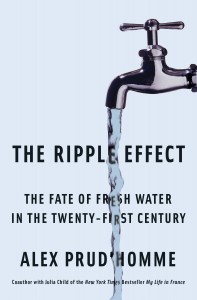
Photo: Elena Seibert
Review
“A river is like a urinary tract.”
And so begins my favorite paragraph in Alex Prud’homme’s new book, The Ripple Effect: The Fate of Freshwater in the Twenty-First Century. (If you are wondering, rivers are studied to learn about the land they drain the way urine is studied to evaluate the health of the body.)
Prud’homme, a former reporter at People and BusinessMonth magazines, was inspired to tackle water contamination after discussions with his great-aunt Julia Child; he collaborated with the famous cook on her memoir, My Life in France.
When not making eye-catching metaphors, the New York native tackles the state of freshwater, how it got here and where it’s headed. He breaks down the freshwater impacts of climate change, drought and privatization conflicts.
The book is global in nature. But I sat down with my copy to find out what Prud’homme thinks of the Great Lakes — they do contain roughly one-fifth of the world’s freshwater, after all.
Wisconsin’s poisoned wells got a shout-out in the synopsis — and then took the spotlight in the chapter on point/nonpoint source pollutants. In 2004, when Glen Stahl sprayed 80,000 gallons of cattle manure onto a field near Green Bay, Wis., he polluted a creek leading to Lake Michigan and put 12 million people at risk of e. coli contamination.
While this chapter had a good focus on Lake Michigan, I was disappointed that the lakes’ formal introduction didn’t come until page 196:
“The five Great Lakes — Superior, Huron, Michigan, Erie, and Ontario — contain about 90 percent of the fresh surface water in the United States and approximately one-fifth of the entire world’s supply.”
So when I got Prud’homme on the phone, I asked why significantly less than one-fifth of his book focused on our five claims to fame. A lot had to do with the attention already given to the 2008 Great Lakes Compact, which restricts how states use the Great Lakes water supply, he said.
“I had to make a strategic decision about that,” Prud’homme explained. “Particularly because of the Compact, a lot has been written about the Great Lakes … People are pretty familiar with what’s happening there. So I decided to cover them to a certain extent, but wanted to deliver more ‘new’ news to readers.”
But he believes the Great Lakes represents how the rest of the world has to grapple with issues like pollution and global warming.
“Every story that’s local is also global,” he said. “The Great Lakes are a laboratory for water issues this century because they’re so big, so important … It’s a good place to study what’s happening.”
(Kind of like a urinary tract?)
Prud’homme’s chapter on privatization was of particular interest to me because of its controversy and relevance in our region as well as across the globe. And while I’m used to hearing the critics of the concept, I appreciated the author’s dual-sided tone. He quotes BP chairman T. Boone Pickens:
“People always say to me, ‘Water is like air. Do you charge for air? Well, no, of course not, and you shouldn’t charge for water, either.’ I say, ‘Okay, go ahead and don’t charge for water and see what happens. You won’t have any water left.”
The chapter also hits close to home because, well, it hits close to home. Pekin, Ill. is referenced because of its history of testing the waters, if you will, of privatization. After selling its water system to American Water Works in 1982, residents saw rates increase by more than 200 percent in 18 years, prompting the city to buy it back.
And the book explains how Akron, Ohio recently considered, but never fully submerged its water system in privatization, deciding that it was too risky.
Wrapping up our chat, Prud’homme explained his title:
“Every time we use water, there is a series of consequences — ripple effect — that most of us are completely unaware of,” he said. “Using antibacterial soap … using herbicides on your lawn, using electricity — there are always consequences. We no longer have the luxury of ignorance. We need to start thinking about water in a new way.”
Head over to Prud’homme’s website for excerpts, where to buy and to check out his Ripple Blog.
Carlee Schepeler is a Great Lakes Echo intern.
